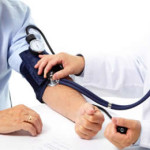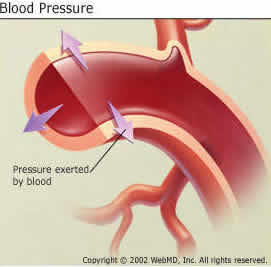How Does Hypertension Contribute To Atherosclerosis?
Hypertension (high blood pressure) can harm the walls of your blood vessels. And arteries (a kind of blood vessel that carries away blood from the heart to the tissues and cells of the body) are typically the most common blood vessels where the bad effects of hypertension occur. And did you know that if you have lots of episodes of high blood pressure, this can increase your chance of having more plague buildups on the artery’s walls or medically called as atherosclerosis. How does it occur and how do the high levels of your blood pressure contribute to atherosclerosis?
Hypertension or high blood pressure is the most common cardiovascular disease. The normal rate of heartbeat at rest can be about 60 to 100 beats /minute. Each beat means your heart is pumping the blood through arteries to distribute blood all around the body.
And in pumping the blood (when your heart beats), there is a pressure inside the arteries called systolic blood pressure. And between beats, there is also pressure inside your veins (blood vessels that carry blood get back to the heart) called diastolic blood pressure.
When you use sphygmomanometer (a common tool to measure blood pressure), you will get two major numbers; systolic and diastolic blood pressure.
Typically, the number of systolic is higher than diastolic. The normal blood pressure (normal BP) is 120 /80 mm HG ‘120 points to systolic BP and 80 points to diastolic BP’ or lower.
Systolic BP that is around 120 to 190 mm Hg – and around 88 to 89 mm Hg diastolic BP can be categorized into the stage of pre-hypertension.
The stage I of hypertension is about 140-159 mm Hg for systolic BP and 90-99 mm Hg for diastolic BP. And for the stage II of hypertension is higher than 160 mm Hg for systolic and higher than 100 mm Hg for diastolic.
It is dependent on how far the fluctuation of your blood pressure goes!
If you are an individual who have normal BP, you can check it for at least once in 2 years. But if your BP is borderline high (prehypertension), your doctor may recommend taking the test for at least once in a year. And in the case if your BP is higher than 140/90, doctor usually ask you to take the test more often (maybe at least once a week and under a doctor’s supervision).
Below is an image (credit to WebMD) that describes the pressure inside a blood vessel:
We all agree that the goal of the test is to get to know real number of your blood pressure. Therefore, it’s important to make sure that you are at the most stable level of your blood pressure during the test.
To get the most accurate result, a blood pressure test is commonly done before your breakfast or after waking up in the morning. Actually, you can do the test anytime. But make sure you avoid cigarette, exercise, caffeine, salt, and other factors that can significantly affect your blood pressure for about 30 minutes before the test.
 If you have some of the following risk factors, you are at high risk of developing hypertension:
If you have some of the following risk factors, you are at high risk of developing hypertension:
- If you are not at your best and healthy weight. More weight that you gain can make your heart work harder in pumping the blood and this can increase the pressure in your blood vessels. See also how losing weight can help lower cholesterol and blood pressure in here!
- Lack of exercise! If you are physically inactive, you tend to lose more lean muscles and gain more fats.
- Having uncontrolled stress. Stress can drastically increase your BP at short time.
- Poor diet, particularly if you stick with diet high in salt and saturated fat.
- Too much consumption of alcohol can also increase your risk.
- And if you have a family history of hypertension.
Arteriosclerosis is a medical term used to call progressive condition for narrowing and hardening of artery. And for atherosclerosis, it belongs to the group of arteriosclerosis.
In other words, atherosclerosis is a kind of arteriosclerosis (the most common kind of arteriosclerosis) – according to Mayo Clinic. It is plague buildups from fatty deposits & cholesterols in the blood. These plague buildups attach on the walls of arteries, therefore they can be potential to narrow and clog an artery which then eventually can block the blood flow.
See also how high cholesterol causes a clogged artery on this section!
Hypertension and atherosclerosis may be not directly linked, but they can affect each other!
As mentioned before, atherosclerosis is a specific type of arteriosclerosis that refers to the buildups of cholesterol and fatty deposits on the artery’s walls. Therefore when it comes to discussing about high BP and atherosclerosis, it also often refers to the link between high BP and high cholesterol.
As well we know, if you have high BP, you are at high risk of getting high cholesterol. In fact, high BP is one of risk factors of high cholesterol. And high cholesterol is also one of risk factors of high BP (hypertension).
Furthermore, most risk factors of hypertension also can increase the risk of high cholesterol – either for the most risk factors of high cholesterol can increase the risk of hypertension. Obesity, lack of physical activity, diet high in salt, diet high in saturated fat, diet low in fiber, and smoking can raise your risk of both hypertension and high cholesterol.
When your heart beats, it will pump blood to all around the body through blood vessels called arteries. Each beat of your heart, your arteries will stretch to accommodate the volume of the blood that flows from your heart to the tissues and cells of the body.
And when you have high blood pressure, this means your arteries will stretch more than usual. Over time, it can damage endothelium, the inner layer of intima (the deepest major layer of your artery).
If there is a damaged site of endothelium, it can be a starting point for any fatty deposits and cholesterol that travel through the blood carried by lipoprotein to become easier in penetrating the wall of artery. As a result, a plague buildup on the artery’s wall (atherosclerosis) occurs.
And if left untreated, over time this plague can be potential to cause narrowing and hardening of artery (arteriosclerosis) or even a blood clot that blocks artery (a life-threatening condition that can cause a heart attack or stroke, depending on where the clogged artery occurs).
Theoretically you can do it as long as you don’t have any fatty deposits or cholesterol that travel through the blood. But it’s a mission impossible, because it’s impossible to eat free-cholesterol and free-saturated fat foods all the time.
In other words, there is always a chance to have some fatty deposits /cholesterol that travel through your blood.
Moreover, both hypertension and high cholesterol are also often found together – as noted before!




